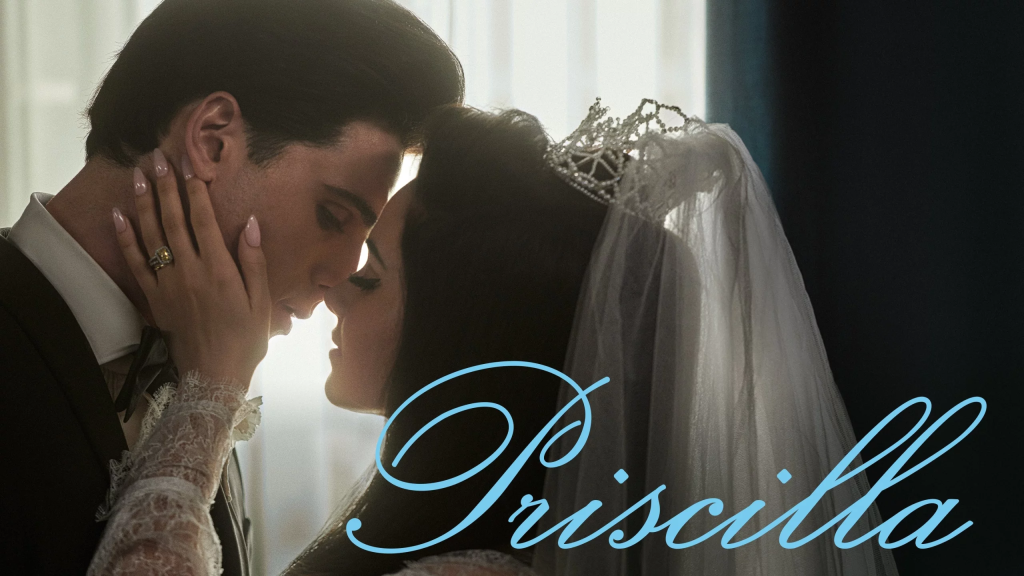
Priscilla
Sofia Coppola is a filmmaker of her own whose movies are all about captivity and isolation, one way or another. In the case of the characters held captive, it’s often a gilded cage, and the cage looking for a bird (as Kafka put it) in “Priscilla” is Elvis Presley.
The King met Priscilla Beaulieu in 1959 when he was in the U.S. Army in Germany; she was the daughter of another officer stationed there and was well, 14 when they were introduced. The movie by Coppola, who wrote it with the director based on Priscilla Presley’s 1985 memoir Elvis and Me, gives us her point of view. And while latter day considerations of Presley’s behavior in courting, or one might say capturing, Priscilla are replete with condemnations of how creepy it was the word “groomer” is tossed around, and seen here in some specific ways it is absolutely apt from the perspective of a dreamy Austin Texas teenager far from home this attention from such a shy superstar is thrilling.
Working in obvious close collaboration with cinematographer Philipe Le Sourd (who shot Coppola’s “The Beguiled”) and editor Sarah Flack (who has been with Coppola since “Lost in Translation”, I must also note that Sarah is a friend), Coppola creates a world of beautiful and remarkably tranquil surfaces. In her room in a nondescript house in Germany, Priscilla reads fan magazines; once out at Graceland and instructed not to be seen on the lawn too much, she lounges around living rooms and dens that got much tackier after she divorced Presley early 1973. A lot of times Priscilla just doesn’t know what to do with herself. As her superstar husband has his film career mismanaged by never seen Colonel Tom Parker (did Sofia Coppola see Hanks in “Elvis” and say, “There’s just no topping Tom Hanks, I shouldn’t even try?” Actually I don’t think that’s it), he’ll leave Memphis for Los Angeles and tell his bride to “keep the home fires burning.”
What is Priscilla there for? Especially since, having arranged to separate her from her family and be more or less her guardian, he absolutely refuses to sleep with her despite an increasing number of requests for intimacy. When they first meet in Germany, Elvis completely sincere and earnest tells the ninth grader (and he is shocked to be told that she’s that young) that he is lonesome for a girl to talk to. His mom had just died. It all seems so innocent.
In the early going they’re both naïfs. Elvis has a poster of “On The Waterfront” in his bedroom, and he tells Priscilla that when he gets back to the States he wants to study at the Actor’s Studio to be like Marlon Brando and James Dean. He takes her to see “Beat the Devil,” and Priscilla is tickled plus awestruck when her friend knows all Bogart’s lines in the movie by heart. He dreams big artistically. She just dreams about him. Only one of them will have their dreams come true. Then it won’t be enough.
This movie is really cool and not in a hurry, as a result of an incredibly accurate performance by Caillee Spaeney. The 25 year old does such a great job playing 14 that it’s almost hard to believe she’ll one day be able to convincingly portray someone pushing 30. But she does it, and beautifully at that. Jacob Elordi looms over her as Elvis, this is an exaggeration from real life but an effective one. This Elvis is soft-spoken, prone to discomfiting eruptions of anger as he becomes more reliant on pills to wake up and go to sleep, all the stuff that killed him, basically, is here but Coppola’s storytelling suggests in less potent form. The picture has some fun with early ’60s Presley oddities; he goes through a Bible-study phase, reads the Autobiography of a Yogi and even experiments with LSD with Priscilla. Coppola’s brief representation of their trip ranks among the most persuasive depictions of psychedelic experience in recent film history. And all the while despite rumored or actual affairs on set he keeps Priscilla chaste until after marriage. Then gets her pregnant immediately.
The movie spends its first 90 minutes underscoring Priscilla’s thwarted desire, it skips the consummation after the wedding ceremony itself. Surely Coppola wasn’t listening to young scolds on social media who hate sex scenes because “they don’t advance the story.” Given how much setup we get for this night and its aftermath, if any sex scene would have furthered things along narratively, it might have been this one. What are we supposed to make of the fact that Coppola leaves it out? Is she being evasive or mysterious or coy or what? (Priscilla Presley serving as exec producer and booster for the movie could’ve prompted some discretion on Coppola’s part, I guess.)
By the end, we see that Elvis has become a captive as well of his fame and more. Shot from behind at one of his countless Vegas shows, he’s caught in a trap he can’t be sprung from by the woman he jailed out of what he sincerely thought was love, who filled a real need for him. His tragedy becomes Priscilla’s liberation. And so Coppola’s movie ends on notes both haunting and poignant.
For More Movies Visit Putlocker.